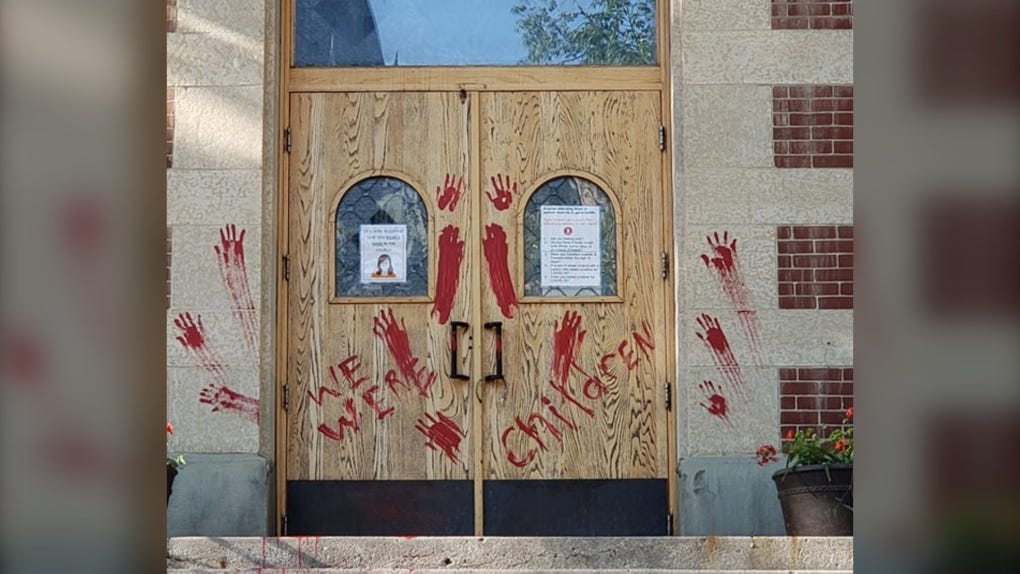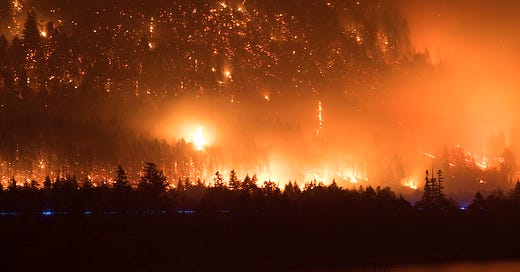“I should just write a piece called Cancel the 4th,” I told someone recently, “and then I can go post it in a bunch of random places, and even if I’m just talking about fire safety and not shooting off a bunch of fireworks above dead trees, someone will send it to Fox News who will pick it up and make it into something about cancel culture and then I’ll be famous and have lots of readers.”
“Sounds like you finally figured out how the internet works,” he told me.
Shouldn’t we though? Cancel the 4th of July, I mean.
I have some personal interest in getting rid of the holiday. I am, as I have sometimes put it, a bit like a puppy on the 4th, once the fireworks get going. I can handle a few unexpected blasts from varied corners of my neighborhood, but there’s a point where the shocks get under my skin and each new explosion makes me jump or shake. I basically want to sit and whimper in a corner.
Turning into a sad puppy in this way is a trauma response, which I link to the time, seven years ago now, when I was in a collision. (Please take the introduction of the topic of trauma as your trigger warning for the rest of this post.) When the response happens, I wonder about others who have experienced similar trauma: if you’re in a car crash, all that sudden sound of vehicles crunching into one another can enter you and live there for a long time. The pops and squeals and cracking sound of tearing metal in turn becomes a crackling up and down the nerves, a jumping of one’s muscles and bones, anytime you encounter something vaguely reminiscent of that near-death moment. When I get all jumpy in response to fireworks I often wonder: who else is cowering in their house right now?
I haven’t experienced the full onslaught of this in a few years, because I now generally avoid cities or any place likely to have big fireworks displays the first week of July. I will pick up a map and look for a wide green swath in the mountains a good distance from any town and say, “Let’s go there.” And we go. It’s been the practice since the last time I failed to do advance planning for the holiday weekend. That year, we ended up at a lakeside picnic for part of the day. We left before dark, both to be further away from the main show and to avoid inebriated motorists flooding the streets once the evening was over. But it wasn’t early enough; someone started sending up fireworks from their backyard before the sun was down, and there was no escaping the sound of explosions as we rode our bikes home. The boom-boom-boom reverberated through me as we rode. As we turned off the path and onto the rough pavement of a side street, my bicycle also began to rattle, so now it was boom-rattle-shake with each pedal stroke, until the push of my legs down and up again began to pull up a clear “No! No! No!” calling from the deep recesses of my brain and, finding myself sobbing, a panic attack fully blossoming, I jumped off my bike and refused to get back on. We walked the last mile to the house. I sweated and flinched the whole way until, indeed, I was in a corner on the couch, and could whimper through the rest of the night.
I had been on a bike the night of the big collision, when a car ran a red light and then kept running straight through me and beyond. The sound of tearing metal that lives in my skin is the sound of my bicycle frame splitting in two. The booms that shake my bones are the deep booms of my body against the hood of the car, the matching thud of my helmet and head and face against the asphalt. It all lives in me, and most days I can keep it quiet or keep it tucked away, push all that nervous shaking into far internal reaches. There are myriad triggers that make that hiding harder to do, that can call it all forth and make it public in the form of a shaky voice or a dramatic display of overwhelm. Fireworks, I learned that July 4th, are one such trigger.
I’m just one person with some vehicular trauma, which maybe doesn’t matter so much. There are hundreds and thousands of us, though, with various levels and varying manifestations of the PTSD that I experienced that night. Hundreds of thousands, really, just counting those who have been in car crashes. To say nothing of veterans that have served in wars, or those who have lived through wars and escaped to now live in this country, each with the sound of death still ringing in their ears and booming in their bones.
All that trauma is just icing on the cake of modern nation-building in the Americas, with its bomb-dropping drones and the fueling of all those car crashes with war-earned oil. What sounds on the 4th trigger panic and trembling for others? As news comes out of the complicity of state and religious institutions alike in the violent assimilationist strategies used to forge the so-called melting pot—and no, this is not just a ‘Canadian thing’, as U.S. officials well know—I wonder if sounds that should be universal signs of joy will be turned, next Sunday, into triggers. This year, will the sound of children shrieking and running remind some of all those who have been lost?

The question, really, is what we intend to do. Holidays run on habits, both personal and social, and habits are hard to overcome. They don’t tend to disappear quickly, even when public accounts of trauma or injustice are brought forth to contest them.
There are many of us who have been quietly opting out of July 4th celebrations in recent years. Perhaps we go hide in the woods. Perhaps we stay in town, swing by a picnic or two, but try to avoid any sporting American flag paper plates and decorations. We figure out how to walk the line of being friendly and sociable near the BBQ while trying to slowly steer a conversation towards the topic of American imperialism. If you do these things, you know: it’s kind of a like a summer Thanksgiving. Opting out or half-participating, however, while not a full endorsement of the violent nationalism implicitly encouraged by July 4th celebrations, fails to disrupt the social habits that keep that nationalism moving.
As far as I can tell, we’re in one of those moments where a lot of people have quiet thoughts about the matter. But the thoughts stay quiet, as we opt out in some small way or another, and wait for someone else to get the action really rolling. Someone else—preferably someone who is already a government official—will think about the impropriety of holding celebratory displays of national greatness when mass graves of children at boarding schools on the continent keep showing up, and offer to hold a vigil instead. Someone else, certainly, will make sure they at least call off the fireworks this year—this year, with its drought and record heat, with our parks full of stressed plants and forests full of damaged trees, all ready to burn—and make sure we have the opportunity to breathe something other than smoke the whole summer.
I looked through a list of 4th of July celebrations in the state of Colorado, where I am currently visiting, and I can tell you: someone else is not on the job. In some fire-prone communities, yes. But more broadly? It appears not.
It is exhausting to know that it cannot always be someone else. Sometimes it must be us. And sometimes, really, we are the best situated for interrupting the habits of the groups we are in. We are the ones most able to pause the group we are gathered with and suggest that we take a moment of silence for those harmed by the project of U.S. nation-building. We are the ones who can let the officials and administrators in our town, who think it’s their job to ensure some kind of event happens, and tell them, “No thanks. Not this year, at least.” We can organize on our block and talk with our neighbors about the possible harm of using fireworks, even small ones. We can potentially start a relationship over shared concerns regarding fire risk, and open up the space to talk about other accompanying harms of the day’s celebration. We can figure out ways to have the devastating conversations with our own kids about other children who did not get to grow up, but should have.
July 4th this year falls on a Sunday [note: this was originally written in 2021], giving those with ties to Christian groups a prime opportunity to change what gets recognized and honored on that day. To my friends who are pastors, I think there’s a clear question here: do you all tell a story of a nation’s growing progress towards racial justice and healing, or do you open up yet more space for hard truths and griefs, for the kind of reckoning that will allow that healing to more genuinely happen?
These smaller social spaces are the real places that change and healing happen: not just from some federal statement or policy up at the top, but from day-to-day interactions with those whom we are in community with, even if only by physical proximity. True, many people may gain a habit of honoring Juneteenth given recent federal action. But it was decades—and decades!—of local practice and local organizing that eventually gave Juneteenth a national stage. The same will be true (though hopefully with a shorter timeline) for changing the Fourth of July. Who knows, maybe some troll will send this to Fox News and the whole concept will get a boost as a result.

Looking at all I’ve written above, I wonder if this isn’t something of a mixed-up post. Post-collision trauma? Impending fires from fireworks? The need to talk about cultural genocide in church? But it’s hard to keep things straight when there’s so much harm happening at so many different scales: from one’s personal experience, to ecological destruction, to outright genocide. Maybe it is mixed up, but if so, the fact that all that can get melded together while discussing a holiday ostensibly celebrating democratic independence suggests we might want to rethink the usefulness of that day. After all, I barely scratched the surface here.
I’m leaving Colorado on the 4th, and hoping to be in some out-of-the-way place in Utah on my way back up home to the Pacific Northwest. Many of the July 4th events there, at least in Portland, have already been called off, as the state still has various COVID restrictions in place around large gatherings. It’s an opportune moment, then, for interrupting the social habit of public celebrations—they’ve already been interrupted. I’ll be looking for other ways I can help strengthen that interruption and move this conversation forward.
I’m curious to know: what are others doing to change the way this holiday happens? If you’re a subscriber, you can post in the comments, and anyone can write me at unsettling@substack.com. Did you make a call to your city? Have an awkward conversation with a friend? How’d it go? What chance do you think we have to #Cancelthe4th?



